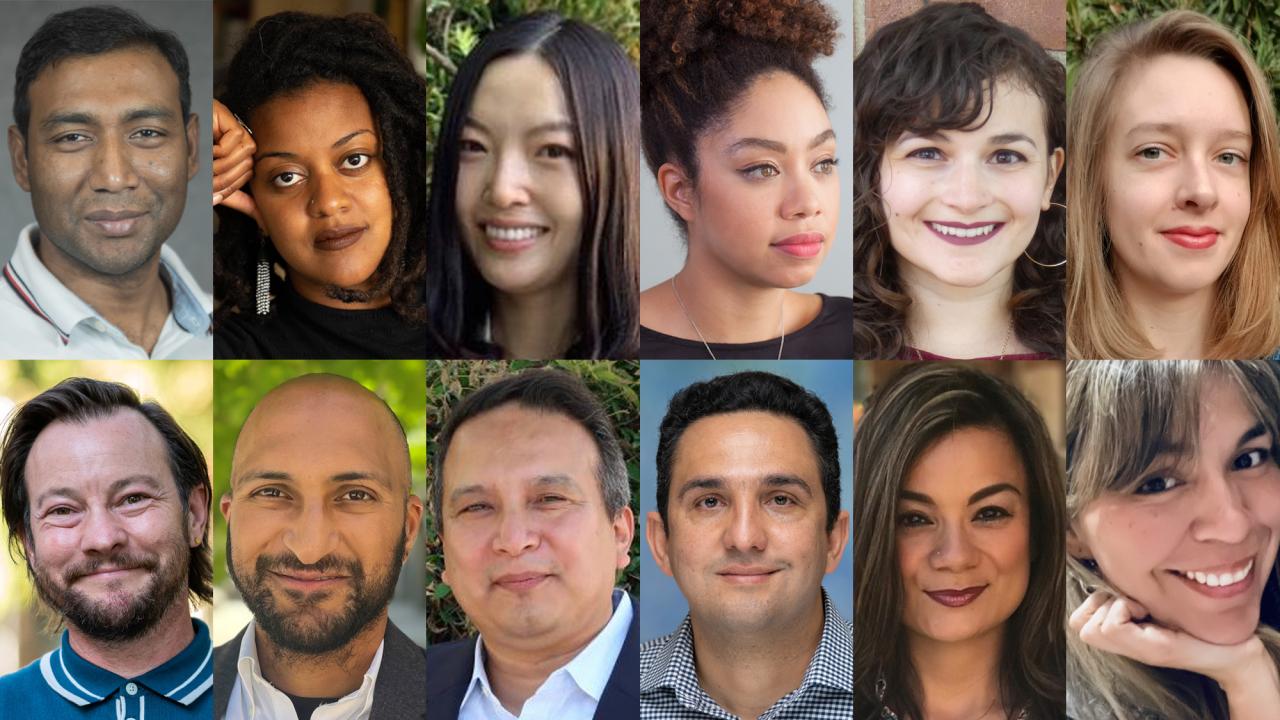A dozen early-career faculty members at UC Davis have been named to this year’s Hellman Fellowship, a program to help propel their work to the next level.
They will each receive grants from $6,000 to $50,000, for a total of $330,000 awarded this year.
“We’re proud to be able to provide this support to foster the scholarship of these promising members of our faculty,” said Phil Kass, vice provost of Academic Affairs, which administers the awards.
The work of the 2023-24 class covers a wide range of topics: foods that could prevent the onset of diabetes, consent in medieval times, undocumented Korean youths, an interactive Black history exhibit, health issues facing transgender people and more.
Ariana Valle, an assistant professor of sociology, was awarded a grant for a project based on 130 interviews with Puerto Ricans and Latinos in Florida, examining how the intersection of colonialism, citizenship, migration and racialization is producing new politics for those groups.
John Lopez, an assistant professor of art history, plans to use the grant to make the final revisions on his book manuscript, The Aquatic Metropolis: Urban Design and Environmental Change at Tenochtitlan-Mexico City.
More information on the fellowship is available on the Academic Affairs website.
Hellman history
San Francisco philanthropists Chris and Warren Hellman started the program in 1995, when their daughter Frances Hellman, then a recently tenured professor at UC San Diego, “observed that while young faculty were well-funded when first hired, challenges would arise after two to three years when start-up resources were exhausted and before other external support was viable,” according to the foundation’s website. “The Hellman family filled this need by providing financial awards for early stage researchers.”
The program was launched at UC San Diego and UC Berkeley, and eventually expanded to all 10 UC campuses, including UC Davis in 2008.
In 2020 the Hellman family provided endowments to each UC campus — $6 million to UC Davis — to continue the awards in perpetuity, through each campus’s Society of Hellman Fellows. The Hellmans also intended their endowments to encourage others to contribute to the societies, as UC Davis did when it allocated $400,000 to the program this year. For more information on donating to the UC Davis society, contact Jennifer Prahl, director of foundation engagement, Office of Development and Alumni Relations, by email or at 530-752-1282.
The 2023-24 fellows
This year’s inductees to the UC Davis Society of Hellman Fellows, and their funded projects, are:
- Shamin Ahamed, Department of Biological and Ag Engineering, College of Agricultural and Environmental Sciences — “Energy Harvesting from Artificial Lighting in Vertical Farming Systems”
- Lishan AZ, Department of Cinema and Digital Media, College of Letters and Science — “In Search of Solid Ground: Immersive and Interactive Black History Exhibit”
- Ga Young Chung, Department of Asian American Studies, College of Letters and Science — “Unexpired: Race, Imperial Futurity, and Undocumented Korean Youth Temporality”
- Zinzi Clemmons, Department of English, College of Letters and Science — “Heaven: A Novel of Black Utopia”
- Kathleen Cruz, Department of Classics, College of Letters and Science — “Competing Visions: Classical Antiquity and Puerto Rican Identity in the 19th and 20th Centuries”
- Grace Delmolino, Department of French and Italian, College of Letters and Science — “Medieval Consent: Sex, Law and Boccaccio’s Fictions of Choice”
- Christoph Hanssmann, Department of Gender, Sexuality and Women’s Studies, College of Letters and Science — “Trans Health in Controversial Times”
- Sameer Iyer, Department of Mathematics, College of Letters and Science — “Formation of Separation and Onset of Reversal for the Stationary Navier-Stokes Equations”
- John Lopez, Department of Art and Art History, College of Letters and Science — “The Aquatic Metropolis: Urban Design and Environmental Change at Tenochtitlan-Mexico City”
- Payam Vahmani, Department of Animal Science, College of Agricultural and Environmental Sciences — “Trans-Vaccenic Acid as a Natural Insulin Sensitizer: Towards Developing Animal Source Foods With Anti-Diabetogenic Properties”
- Ariana Valle, Department of Sociology, College of Letters and Science — “Citizenship in Contexts: How Puerto Ricans are Transforming Race and Politics in Florida”
- Emily Vazquez, Department of Spanish and Portuguese, College of Letters and Science — “Border Biomes: Coexistence and Interference on American Migration Trails”
Media Resources
Cody Kitaura is the editor of Dateline UC Davis and can be reached by email or at 530-752-1932.
